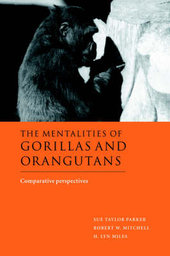
|
The Mentalities of Gorillas and Orangutans: Comparative Perspectives
Paperback / softback
Main Details
| Title |
The Mentalities of Gorillas and Orangutans: Comparative Perspectives
|
| Authors and Contributors |
Edited by Sue Taylor Parker
|
|
Edited by Robert W. Mitchell
|
|
Edited by H. Lyn Miles
|
| Physical Properties |
| Format:Paperback / softback | | Pages:432 | | Dimensions(mm): Height 233,Width 155 |
|
| Category/Genre | Primates |
|---|
| ISBN/Barcode |
9780521031936
|
| Classifications | Dewey:599.8815 |
|---|
| Audience | | Professional & Vocational | |
|---|
| Illustrations |
49 Tables, unspecified; 29 Halftones, unspecified; 30 Line drawings, unspecified
|
|
Publishing Details |
| Publisher |
Cambridge University Press
|
| Imprint |
Cambridge University Press
|
| Publication Date |
23 November 2006 |
| Publication Country |
United Kingdom
|
Description
Research on the mental abilities of chimpanzees and bonobos has been widely celebrated and used in reconstructions of human evolution. In contrast, less attention has been paid to the abilities of gorillas and orangutans. This 1999 volume aims to help complete the picture of hominoid cognition by bringing together the work on gorillas and orangutans and setting it in comparative perspective. The introductory chapters set the evolutionary context for comparing cognition in gorillas and orangutans to that of chimpanzees, bonobos and humans. The remaining chapters focus primarily on the kinds and levels of intelligence displayed by orangutans and gorillas compared to other great apes, including performances in the classic domains of tool use and tool making, imitation, self-awareness, social communication and symbol use. All those wanting more information on the mental abilities of these sometimes neglected, but important primates will find this book a treasure trove.
Reviews'... this book contains much valuable information on gorillas' and orang-utans' mental life.' Animal Behaviour '... and the present volume will go a long way towards bringing gorillas and orangutans back into the limelight of modern comparative cognition. For that the editors and contributors should be commended.' James R. Anderson, The Quarterly Journal of Experimental Psychology
|